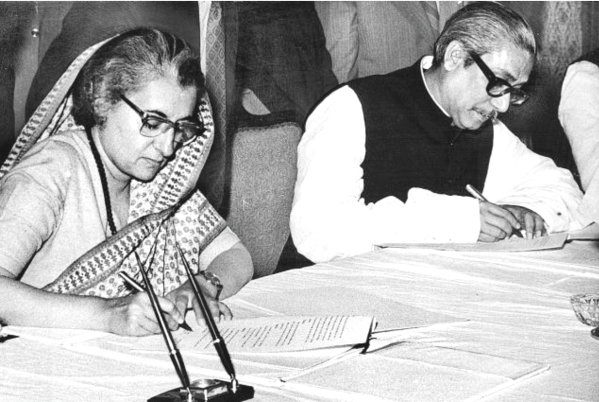
Inside
|
India-Bangladesh Relations:
A Forty-Year Retrospective
ZIAUDDIN CHOUDHURY examines the bumpy relationship between the two neighbours and how they can be good for each other.
 PORNPOJ NANTAJEEWORAWAT/GETTY IMAGES
PORNPOJ NANTAJEEWORAWAT/GETTY IMAGES
A challenge to those of us who arrived in the US in the fledgling years of Bangladesh independence was how to introduce ourselves to our hosts in this country. India they all knew about, and to a great extent Pakistan -- thanks to the US interests in that country. The better informed segments in the US were aware of the struggle for Bangladesh -- many in fact had lobbied for it. But it seemed to disappear to most in this country as the memory of Indo Pakistan war of 1971 gradually started to dissipate from the public mind here.
Who were we? A new country that separated from Pakistan, or a country that existed in the shadow of a much larger India that people here immediately recognised? It would take many more years for us to make a mark as a country and a nation in these distant shores. For this we have to be thankful, thankful to our patient and hardworking people, and to our well wishers across the globe and our partners in progress. And this includes our gigantic neighbour in whose shadow we live, and with whose support we got our independence. We can never forget that.
The paradox, however, is that despite a fairly harmonious relationship that dates to the birth of Bangladesh, questions have often been raised domestically and abroad on the costs and mutual benefits the two countries have derived since the inception. Did India unwittingly create a third threat on its borders and a burden for its economy when it helped in the Bangladesh war of independence against Pakistan? Did Bangladesh swap one economic domination for another when it gained its independence from Pakistan? Did India ever visualise that it would have to build hundreds of miles of barbed wire fencing along its border with Bangladesh to stop illegal crossing when four decades ago it had welcomed a sea of refugees into India? Did Bangladesh know that the alliance and friendship of 1971 could be replaced by a lack of trust and suspicion in last 40 years?
The questions pop into our mind as we stand some 40 years later down the road after the first historic visit of the Indian Prime Minister Indira Gandhi to the newly born Bangladesh in 1972 -- a birth for which she was referred to as the midwife in some quarters. These questions arise as we welcome another Indian Prime Minister to Dhaka after that historic visit. The 1972 visit led to the historic agreement of peace of 1972 between India and Bangladesh, which cemented publicly Bangladesh's deep gratitude to India for its support in the 1971 war. The euphoria and optimism that surrounded that agreement have since given way to cynicism in both countries on intentions, deficits of trust, and ambiguity on future relationship. What has gone wrong?
Over the last 40 years India has grown from a struggling underdeveloped country to a near middle-income behemoth defying the expectations of its critics of the 1970s. Its economy has grown many fold, from a mere $480 billion dollars in 1970 to $1.8 trillion in 2010. It is recognised as an emerging economic super power that has posted an impressive 8% annual growth for the last 10 years in a row. It has become the principal supplier of information technology professionals in the world, and has become the major location for global support of information technology. Foreign investors have flown in droves to India; the total investment in the last 10 years was nearly one trillion dollars. India is the second most sought after destination in the world for foreign investment after China.
Contrast these with the development in Bangladesh in the same period. True, our economy has grown also, but it is only a shade compared with India (about one twentieth in size). We have a large funding gap in our development budget for which we are still dependent on our foreign allies and international development agencies. We still have a third of our population below extreme poverty; we have a large segment of our population (nearly 50%) who cannot read or write. Even with liberalisation of the economy foreign investors are shy to put their money in Bangladesh. We had less than a billion dollars of foreign investment in 2010 compared with over
40 billion in India. Surely, India cannot consider us an economic rival. Similarly for Bangladesh it is ridiculous to even consider India as a competitor simply because it is too large to compete with.
The answers for the bumps and grinds in the bilateral relationship of the two countries have to be found elsewhere. Some of these may just be perception, but mostly these are rooted to ground realities and happenings over the last 40 years. As time passed conviviality and bonhomie of our fledgling friendship began to give way to cynicism and lack of enthusiasm. Several factors stood in the way.
 PHOTO: THE HINDU
PHOTO: THE HINDU
For Bangladesh, the relationship began to be affected by lopsided trade, unstopped smuggling across the border, contentious water issues and the lingering problems with enclaves (Chitmohals) that never seem to be resolved despite the 1972 agreement. India, on the other hand, started to have second thoughts about Bangladesh's good will, some of which resulted from political changes in Bangladesh in 1975, and some on India's conjecture on Bangladesh being a hideout for eastern India militants. India has also been fearful of rise of radical forces in Bangladesh under the patronage of political parties that are openly inimical to India.
Let us look at the ground realities and their impact on our bilateral relationship. Over 15% of Bangladeshi imports come from India while Bangladeshi goods are less than 1% of India's total imports. Illegal trade between the two countries amounts to three-fourths of regular trade. Ever since Bangladesh's independence there has been a substantial informal unrecorded trade across the India-Bangladesh land borders.
Some of this trade has been termed as “informal” rather than illegal, because there is wide participation by local people in the border areas, and the field operators generally operate in liaison with the anti-smuggling enforcement agencies”. Illegal trading of goods between two countries
with a common border is a fairly old practice, but smuggling across the border in India and Bangladesh becomes almost a political issue when law enforcers on both sides become parties or facilitators of this “informal” trade. Smuggling will cease if the incentives for this operation cease. We need better understanding and agreement on tariffs, and if possible, doing away with them completely in both countries.
Add to this the perennial problem of criminal acts on both sides of the border, from cattle theft to more serious gang operations. Fence or no fence people living on two sides of the border continue to ply from one side to another, deluding the law enforcing agencies. Shooting down of people suspected of criminal acts by the border patrols often becomes politically charged and acrimonious accusations of foul play fly back and forth. There is a need to have some ground rules and agreement at the highest level to stem these activities.
Next irritant in the relationship has been the perennial debate over our common rivers and perceived threats, real or unreal, of creation of barriers to regulate the flow of water in some rivers across the border. Since Farakka Barrage Bangladesh has been paranoid about possible water schemes across the border and it has been trying to achieve consensus on a number of rivers that flow from upstream. A far reaching agreement has so far eluded both countries. We need to have continuous dialogues on water issues and agreement that no projects on both sides would be undertaken without complete agreement of both countries.
Chitmohols or the enclaves along the Rangpur and Coochbehar border are another never-ending problem that irks our relationship. The enclaves were part of the high stake card or chess games centuries ago between two regional kings, the Raja of Coochbehar and the Maharaja of Rangpur. In 1974, both countries agreed to exchange the enclaves or at least provide easy access to the enclaves, but since then little has materialised. Talks between the two countries on the issue resumed in 2001, but the lack of a concrete time frame has relegated the issue to the back burner. Residents of the enclaves may only go to their respective countries on the production of an identity card, after seeking permission from the border guards, causing much resentment. We need a resolution.
Indian apprehensions about Bangladesh are more political than economic. The political apprehensions have developed since the violent changes of 1975 that ushered in a government in Bangladesh that was not eyed with friendly eyes by India. The apprehensions did not diminish for many years as each of the governments following the 1975 change caused concern to India by their policies and actions. The relationship would come to a critical test when India suspected and even accused Bangladesh of providing shelter and support to militants fighting in its eastern border. There would be counter accusation from Bangladesh of vilification by India. Barbs were exchanged, and the relationship went sour.
A successful bilateral relationship is based on trust, accommodation and understanding. The relationship between India and Bangladesh spans nearly four decades. This relationship is rooted not only in the help and succour that Bangladesh received in its war of liberation, but also in the heritage and history that the two countries share. It has been a bumpy ride in our relationship with India, both sides irked from time to time by events that could have been better managed.
India-Bangladesh relationship has not come at a crossroads now. We continue to travel along the same path despite occasional misunderstandings. Despite our relatively small size both in area and economy, India and Bangladesh can complement each other in many ways. Economically, instead of being a drag to India, Bangladesh can be a supplement to its growth and vice versa. But for this we need equitable agreement on trade, transit and access to each other's economy. A politically and economically unstable Bangladesh is just as bad for India's growth as for Bangladesh itself.
Politically, instead of harbouring suspicions on each other we need to have dialogues on bilateral problems. Perceptions and misunderstandings can be removed only by exposure to realities on the ground. This exposure should not be confined at leadership level of both countries. This exposure could be made at all levels through organised visits to both countries by parliamentarians, political party workers, academics and business people. Let opinion makers at all levels see for themselves the realities in both countries and find out how much our ordinary people have in common in both countries.
Some 40 years ago, a brave and spirited Prime Minister of India gave us moral and material support in our war of liberation against many odds. This she followed with another agreement of friendship and support in our fledgling years. We hope that the spirit of 1972 is revived with the next visit of an Indian Prime Minister to solve all our differences and that we march ahead.
Ziauddin Choudhury works for an international organisation in the USA.